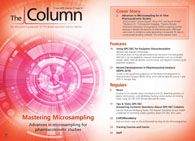Recent Developments in Pharmaceutical Analysis (RDPA 2015)
A look to the upcoming symposium on the Recent Developments in Pharmaceutical Analysis (RDPA 2015), which will be held 28 June to 1 July 2015 in Perugia, Italy.
A look to the upcoming symposium on the Recent Developments in Pharmaceutical Analysis (RDPA 2015), which will be held 28 June to 1 July 2015 in Perugia, Italy.
A symposium on the Recent Developments in Pharmaceutical Analysis (RDPA 2015) will be held at
the University of Perugia, Perugia, Italy, from 28 June to the 1 July 2015.
The Scientific and Organizing Committees invite you to RDPA 2015, which will be held in Perugia, Italy, a beautiful city with an outstanding architectural heritage.
The programme will include plenary and keynote lectures, as well as oral and poster presentations on a wide range of topics including: advanced methods and instrumentation; hyphenated techniques; fundamentals (theories, retention models, chemometrics); (bio)pharmaceutical analysis; food analysis, nutraceuticals, functional food, natural products; proteomics, glycomics, metabolomics; biomarker discovery; and sample preparation, validation, quality by design, and data processing. Participation of young researchers, both from industry and university, will be facilitated by low registration fees.
Great opportunities to meet colleagues in informal discussions will be made easy by an attractive location, taking advantage of a city that offers a multitude of cultural, historical, and artistic attractions, all at walking distance from the symposium venue.
E-mail: symposium@rdpa2015.com
Website: rdpa2015.chimfarm.unipg.it

New TRC Facility Accelerates Innovation and Delivery
April 25th 2025We’ve expanded our capabilities with a state-of-the-art, 200,000 sq ft TRC facility in Toronto, completed in 2024 and staffed by over 100 PhD- and MSc-level scientists. This investment enables the development of more innovative compounds, a broader catalogue and custom offering, and streamlined operations for faster delivery. • Our extensive range of over 100,000 high-quality research chemicals—including APIs, metabolites, and impurities in both native and stable isotope-labelled forms—provides essential tools for uncovering molecular disease mechanisms and exploring new opportunities for therapeutic intervention.
New Guide: Characterising Impurity Standards – What Defines “Good Enough?”
April 25th 2025Impurity reference standards (IRSs) are essential for accurately identifying and quantifying impurities in pharmaceutical development and manufacturing. Yet, with limited regulatory guidance on how much characterisation is truly required for different applications, selecting the right standard can be challenging. To help, LGC has developed a new interactive multimedia guide, packed with expert insights to support your decision-making and give you greater confidence when choosing the right IRS for your specific needs.

.png&w=3840&q=75)

.png&w=3840&q=75)



.png&w=3840&q=75)



.png&w=3840&q=75)








